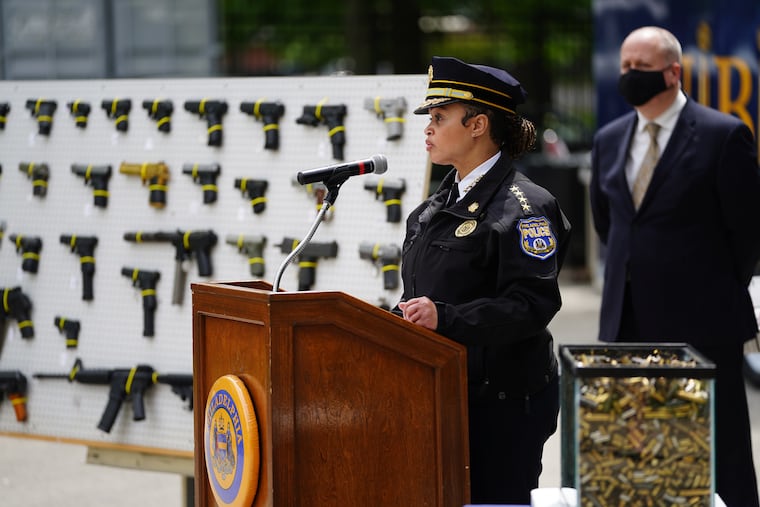Philly’s top cop says she and DA Krasner ‘just don’t agree’ on how to reduce shootings
"Fundamentally, there are very key disconnects there," Outlaw said, "as far as which crimes we prioritize, and who believes what are the main drivers of the violent crime that we’re seeing."

Philadelphia’s top law enforcement officials don’t agree on which crimes they should prioritize while seeking to address the city’s record-setting gun violence crisis, a notable disconnect made public yet again this week.
The Philadelphia Police Department is focused on arresting people for dealing drugs and illegally carrying guns, Police Commissioner Danielle Outlaw said this week, but top brass don’t see the District Attorney’s Office prioritizing the prosecution of those crimes.
During a biweekly news conference with Mayor Jim Kenney on Wednesday, the city’s top cop said she and reform-minded District Attorney Larry Krasner “just don’t agree” on whether illegal gun and narcotics charges can reduce violent crime, making it hard to progress in slowing the bloodshed.
”Fundamentally, there are very key disconnects there, as far as which crimes we prioritize, and who believes what are the main drivers of the violent crime that we’re seeing,” Outlaw said.
Jane Roh, a spokesperson for Krasner’s office, said violent crimes “have always been the top priorities” and said all law enforcement should be squarely focused on shooting and homicide investigations. She pointed to low clearance rates, saying that so far this year, police have made arrests in just 29% of homicides and 15% of nonfatal shootings.
“No public official should be defending that, much less spinning it,” she said in a statement. “Our communities and our neighbors who have been wounded or killed by gun violence deserve real leadership and action.”
Outlaw’s comments marked another public dustup between some of the city’s key law enforcement figures who are tasked with addressing a grim surge in shootings that is disproportionately affecting some of Philadelphia’s most disadvantaged communities. The news conference came just days after the city recorded 400 homicides in nine months, an 18% spike compared with the same time last year, and police statistics show more than 1,700 people have been shot so far this year.
They also came during an especially violent stretch. Between Sept. 20 and Sept. 26, there were 20 homicides in the city, nearly double the number of people killed the week before. The majority of the homicides were committed with guns. During the same period, 71 people were shot.
And a few hours after the virtual news conference Wednesday, a 13-year-old girl was taken to St. Christopher’s Hospital with a gunshot wound to the back and was hospitalized in stable condition. Police believe she may have been hit by a stray bullet while sitting in a car with her father in North Philadelphia.
Outlaw said police believe some of the main drivers of the spike in violence since the spring of 2020 are domestic incidents, neighborhood beefs that escalate on social media, and narcotics sales. She also said officers are taking a record number of guns off the street, and an Inquirer analysis earlier this year showed convictions of those crimes have dropped during Krasner’s tenure.
His office has long contended that there’s little evidence to suggest people who are arrested in Philadelphia for nonviolent gun offenses go on to commit shootings and homicides. Roh said Thursday that the office believes the number of people arrested primarily for drug dealing who go on to commit a shooting shortly after “would be similarly insignificant.”
That conclusion is difficult to assess considering about four in five shootings in Philadelphia don’t result in charges, meaning little is known about those perpetrating the majority of gun violence in the city and what their criminal backgrounds are.
The long-simmering disconnect among the city’s top law enforcement officials burst into public view last month when Kenney and Krasner publicly traded insults with each other after members of City Council traveled to Chester to learn about how officials there have collaborated to fight gun violence.
On Wednesday, Kenney said any conflict with the district attorney “got blown up to be more than it is.” He said members of their staffs collaborate regularly, and Outlaw said she and Krasner have a “cordial and professional” relationship.
However, she added, “if there is some fundamental differences in how we prioritize cases and what we believe is driving violent crime, ultimately, we can meet all day and we’re gonna have to walk away and agree to disagree.”